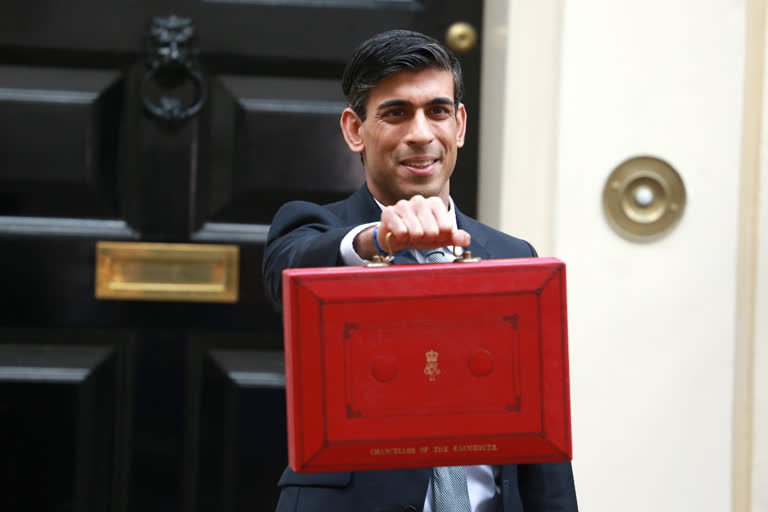London: United Kingdom's Indian-origin politician Rishi Sunak, who was appointed as the Finance Minister on Feb 13, 2020, by Prime Minister Boris Johnson in a Cabinet reshuffle, is all set to present the second budget of his term on Wednesday.
Sunak, the son-in-law of Infosys Co-founder Narayana Murthy, joined Home secretary Priti Patel on the top government bench as UK Chancellor of the Exchequer.
Before presenting the budget speech, due on Mar 3, Sunak said that he wanted to "level with people" about the "shock to the economy" caused by Covid.
The choices he makes will shape the finances of the nation.
UK Budget 2021:
Rishi Sunak's budget will be one of the most closely observed in years, as the UK government grapples with an extreme economic crisis as it is faring under the twin impacts of coronavirus pandemic and Brexit.
Earlier Sunak has said he "is preparing a Budget that provides support for people" as Covid lockdown rules are eased.
At the earliest restrictions in England are set to be fully lifted by 21 June.
UK Chancellor of the Exchequer Rishi Sunak is expected to set aside GBP 22 billion for a new infrastructure bank when he tables his budget in Parliament.
Read:| UK govt set to reveal big spending plans: Think-tank
The Indian-origin finance minister, who has had to present a series of mini-budgets since he took charge of the key Cabinet post in February last year to tackle the financial fallout of the COVID-19 pandemic, will lay out the government's vision for emerging out of the economic crisis over the year.
Among some of the big announcements expected to include a boost for first-time homebuyers with a mortgage guarantee scheme and a major cash injection for a traineeship scheme to boost job prospects.
Another highlight announcement will be geared towards the government's green economy plans by setting aside an initial GBP 12 billion of capital and GBP 10 billion of government guarantees for a new UK Infrastructure Bank.
The cash comes ahead of the UK hosting the United Nations climate change COP26 conference in Glasgow in November.
The new bank is expected to be launched in the coming spring months and operate UK-wide and it is hoped will unlock billions more in private finance to support GBP 40 billion of infrastructure investment for the economy.
“We are backing this bank with the finance it needs to deliver modern infrastructure fit for the 21st century and create jobs,” Sunak told reporters.
“This shows how serious we are about levelling up the country so that everybody can benefit from our future prosperity. Britain's businesses and the great British public deserve world-class infrastructure and that is exactly what this new bank will help us deliver for them,” he said.
Read:| Infosys founder Narayana Murthy's son-in-law appointed as UK FM
The new bank will offer a range of products, including equity, loans and guarantees, which can be tailored to support the needs of private sector infrastructure projects, in sectors such as renewable energy, carbon capture and storage and transportation.
It will also offer infrastructure loans to mayors and local authorities at low rates to help fund high-quality projects in every region and nation – helping to level up the UK.
The minister is also expected to commit a further GBP 375 million to co-invest alongside the private sector in high-growth, innovative UK firms.
The so-called “Future Fund: Breakthrough” scheme will ensure the government supports innovative companies, such as those working in life sciences, quantum computing, or cleantech, that are aiming to raise at least GBP 20 million of funding.
UK Budget 2020:
On Mar 11 2020, Rishi Sunak announced a 30 billion pound stimulus "to support British people, jobs and businesses", as he warned that coronavirus could have a "significant impact" on the country's economy.
Sunak said that among his "extraordinary measures" were 7 billion pounds to "support the self-employed, businesses and vulnerable people", while he had also set aside a 5 billion pound emergency response fund to support the National Health Service and other public services, which can go further if necessary.
Know the Chancellor of the Exchequer:
Rishi Sunak took charge of the second most important government position as the finance minister on Feb 13, 2020.

Earlier, Sunak served as the Chief Secretary to the Treasury. The MP for Richmond in Yorkshire, married to Murthy's daughter Akshata, first entered the UK Parliament in 2015 and has fast risen the Conservative Party ranks as a staunch Brexiteer who had backed Johnson's strategy to leave the European Union (EU).
The UK-born son of a pharmacist mother and a National Health Service (NHS) general practitioner (GP) father, Sunak is an Oxford University and Stanford graduate.
Read:| Britain's post-Brexit budget to combat virus fallout
He co-founded the global investment firm and specialised in investing in small British businesses before he entered politics. He strongly believes that small businesses in the UK would flourish as a result of Brexit as the vast majority of British businesses (94 per cent) don't have anything to do with the EU, but they are still subject to all EU law.
Indian-origin leaders in Boris govt:
Indian-origin Priti Patel, Alok Sharma and Suella Braverman are some other Indian-origin leaders who are currently serving under the government of Prime Minister Boris Johnson.

Priti Patel was appointed Secretary of State for the Home Department on 24 July 2019. She was elected Conservative MP for Witham in May 2010.
Alok Sharma was appointed full-time President for COP 26, the 26th United Nations Climate Change Conference, on 8 January 2021. He was previously Secretary of State for Business, Energy and Industrial Strategy and President for COP 26 between 13 February 2020 and 8 January 2021.
Suella Braverman was appointed Attorney General on 13 February 2020. She was previously Parliamentary Under-Secretary of State at the Department for Exiting the European Union from January to November 2018.
(with inputs from agencies)
Read:| 30 bn pound stimulus in British Chancellor Sunak's first budget



